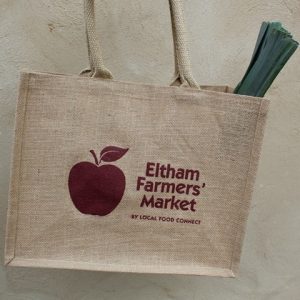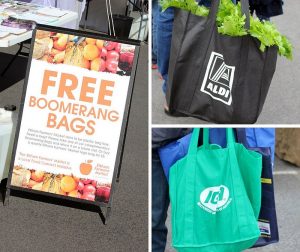Waste reduction
As part of our aim to be as sustainable as possible, we aim to reduce the total waste generated at the market.
All disposable options, whether recyclable or not, require energy to produce and recycle. This is not ideal… so we are looking to change the attitudes and behaviours of customers and stallholders alike to encourage reusable options and lessen waste.
The market has had a no single-use plastic bag policy for several years. Customers are encouraged to bring their own reusable bags for use at the market. For those that haven’t brought their own bags, there are two options available:
 First, Eltham Farmers’ Market branded reusable jute bags are available from the information marquee for $5.
First, Eltham Farmers’ Market branded reusable jute bags are available from the information marquee for $5.
Second, the market has its own version of the ‘boomerang bags’ system whereby reusable bags are recycled at the market from people who have accumulated too many at home to people who visit the market and need some bags. These bags are available at the information marquee for visitors to borrow at no cost. Patrons are requested to return bags at a future visit for someone else to use. This system works well and is largely self-replenishing.
Looking forward, we would like to phase out the use of all single-use plastic at the market, including ‘bagged produce’ (except where food safety requirements require their use). We will progress this by actively promoting the use of reusable options or paper bags, plus potentially selling fruit and vegetable  mesh bags.
mesh bags.
Our coffee vendors offer a discount to those bringing their own cup and we have developed signage to encourage this.
Due to health and safety reasons – having spoken with local council – we have not yet found an appropriate way to implement a washing station.
Finally, our understanding is that, whilst customers can BYO their own containers, bottles, glasses, cups, etc, the burden of food safety responsibility unfortunately lies with stallholders if someone gets sick. For example, if someone brings and uses their contaminated coffee cup and gets sick, liability lies upon stallholders. For this reason, it’s up to individual stallholders as to whether they accept reusable options for their products to be sold on or in.
